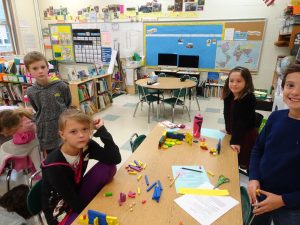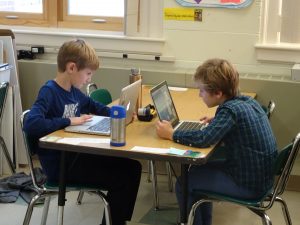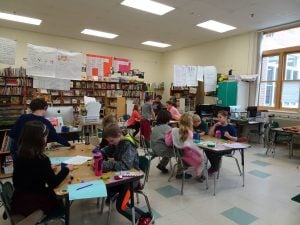 I have appreciated meeting and planning with you about how we can best support your child’s learning during the next part of the school year. Thank you for your time and effort. Because of our conversations, I’ll be planning more frequent small group opportunities, begin some reflective journaling designed to help children become more self-directed and setting aside a corner of the classroom as a recording studio where children can document their understanding and comprehension orally. I look forward to discovering how these options will add to the opportunities of our classroom.
I have appreciated meeting and planning with you about how we can best support your child’s learning during the next part of the school year. Thank you for your time and effort. Because of our conversations, I’ll be planning more frequent small group opportunities, begin some reflective journaling designed to help children become more self-directed and setting aside a corner of the classroom as a recording studio where children can document their understanding and comprehension orally. I look forward to discovering how these options will add to the opportunities of our classroom.
Mapping
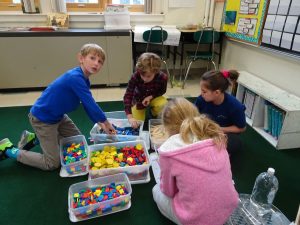 This week we explored maps. We read about them. We learned that most maps have six basic elements: keys (or legends), a compass rose, a scale, a title, labels and symbols. We put map puzzles together. We tried to create paper maps of the world. We drew maps of the classroom and worked as teams to create a 3-D map of our classroom. We tried including all of the elements (excluding scale) when we created maps of our yards. Next week we’ll be using our maps to lead us into some personal narratives telling about the places we play and the stories that grow from our games and imagination.
This week we explored maps. We read about them. We learned that most maps have six basic elements: keys (or legends), a compass rose, a scale, a title, labels and symbols. We put map puzzles together. We tried to create paper maps of the world. We drew maps of the classroom and worked as teams to create a 3-D map of our classroom. We tried including all of the elements (excluding scale) when we created maps of our yards. Next week we’ll be using our maps to lead us into some personal narratives telling about the places we play and the stories that grow from our games and imagination.
 In addition to mapping we’ve been exploring the ways people divide up and label the places that we live. It is abstract and seems to feel random to the children. We live in neighborhoods, towns, counties, states, countries and continents. You can see from some of the work sent home this week that this can be confusing. It is interesting to learn about our place in the world and it is interesting to understand how others live as well – the same, but different. Next week the children will be selecting a country to research and share with others.
In addition to mapping we’ve been exploring the ways people divide up and label the places that we live. It is abstract and seems to feel random to the children. We live in neighborhoods, towns, counties, states, countries and continents. You can see from some of the work sent home this week that this can be confusing. It is interesting to learn about our place in the world and it is interesting to understand how others live as well – the same, but different. Next week the children will be selecting a country to research and share with others.
Family Stories
As we move through the winter we’ll be focusing on narrative writing. Lately we have begun Writer’s Workshop with silent, focused quick-writes. We’re using them to gather snippets and story ideas. We’ve written about time spent with family, favorite meals, times playing outside, favorite memories from when we were younger and seasons we enjoy.
Your child is going to ask you (some already have, and others may need to reminded of this task) what memories you have from when you were 8 or 9 and in 3rd grade. Please tell what you can – these stories do not have to be about school. They can be any memories you care to share and have shared again in the classroom. Some of our quick-writes next week will be attempts to begin writing these stories down.
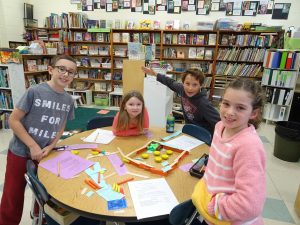 Also next week, the class will develop a set of interview questions. We hope to be able to talk to extended family members and uncover their stories from third grade (or there about) as well. We are hoping to ask grandparents, aunts and uncles, cousins or special family friends to share stories. After the December break, we’ll try to write some of those stories down too. When each of the children has collected a handful to stories, they’ll be asked to choose one to develop, revise and polish until it is ready to be published.
Also next week, the class will develop a set of interview questions. We hope to be able to talk to extended family members and uncover their stories from third grade (or there about) as well. We are hoping to ask grandparents, aunts and uncles, cousins or special family friends to share stories. After the December break, we’ll try to write some of those stories down too. When each of the children has collected a handful to stories, they’ll be asked to choose one to develop, revise and polish until it is ready to be published.
Please don’t require your child to write the stories down outside of the classroom. Their job is to listen well and imagine every detail. I hope you enjoy recalling memories and sharing stories as a family.
Bits and Pieces –
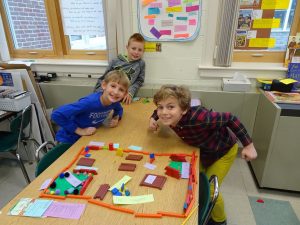 We’ve begun to learn about sketch-noting as a tool to enhance comprehension. We’re learning more about visualizing and adding actions and details to our mind pictures as we listen to read-alouds and also as we read independently.
We’ve begun to learn about sketch-noting as a tool to enhance comprehension. We’re learning more about visualizing and adding actions and details to our mind pictures as we listen to read-alouds and also as we read independently.- We’ve continued reading The Seven Wonders of Sassafras Springs. Eben has collected four Wonders as he walks through his small town. Talk to your child about the stories he’s collected and the Wonders he’s found. Maybe you have “Wonder” stories in your family too.
- Several of the children have chosen to write to the authors of the books they read in their book clubs. As part of the book club assignment, the readers were asked to think of questions they might have for the author. These questions lead to the letters. Perhaps there will be a response. That would be exciting.
- We’ve been exploring graphing, time elapse problems in math and working with larger numbers. We’re identifying the multiplication facts we easily know so we can be more focused on strategies for learning the facts that are harder to add up or count on.
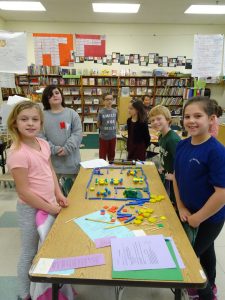 It would be greatly appreciated if you could find time to talk with your child about what it means at your house to put forth one’s best effort. For some children, it seems, working fast is best. That means they skim across the activities doing what they already know rather than extending them to learn “new”. As a result, expectations are only partially met. For other children it seems as though assignments are secondary, being social comes first. Conversation consumes their time. They approach tasks as if they can get them done eventually. As a result of these choices, expectations are seldom met. They simply run out of time. All of the children need support with organizing, prioritizing and managing time. They need to find ways to listen to their inner voice as they explore ideas and find opportunities for learning in all they do whether simple or complex. Our new learning journals are an attempt in the classroom to build these understandings, deepen thinking and strengthen self-monitoring skills. Thank you for your help in exploring these ideas with your child. It is exciting to see how learning grows.
It would be greatly appreciated if you could find time to talk with your child about what it means at your house to put forth one’s best effort. For some children, it seems, working fast is best. That means they skim across the activities doing what they already know rather than extending them to learn “new”. As a result, expectations are only partially met. For other children it seems as though assignments are secondary, being social comes first. Conversation consumes their time. They approach tasks as if they can get them done eventually. As a result of these choices, expectations are seldom met. They simply run out of time. All of the children need support with organizing, prioritizing and managing time. They need to find ways to listen to their inner voice as they explore ideas and find opportunities for learning in all they do whether simple or complex. Our new learning journals are an attempt in the classroom to build these understandings, deepen thinking and strengthen self-monitoring skills. Thank you for your help in exploring these ideas with your child. It is exciting to see how learning grows.
